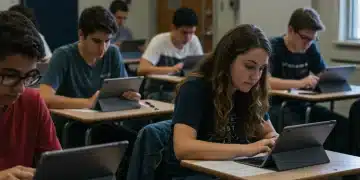whom textbook policy updates: a must-know for educators

Textbook policy updates are crucial for educators to align with current educational standards, enhance student engagement through diverse and inclusive content, and effectively implement new teaching methods using digital resources.
Whom textbook policy updates can significantly influence educational practices today. As the landscape of education evolves, staying informed about these changes is essential for educators striving to enhance their teaching methods. Curious about how it relates to you? Let’s dive in!
Understanding whom textbook policy updates
Understanding whom textbook policy updates are essential for anyone involved in education. These updates can affect curriculum design, teaching methods, and resource allocation. By keeping up with these changes, educators can ensure that their teaching remains relevant and effective.
The Purpose of Textbook Policy Updates
Textbook policies are updated to reflect the latest educational standards and technological advancements. They aim to improve the learning experience for students. Schools and districts often review and revise their policies to better align with educational goals.
Key Considerations for Educators
When reviewing textbook policy updates, educators should consider the following:
- How do the updates align with current teaching strategies?
- What resources are available to help implement these changes?
- How can these updates enhance student engagement?
- What training may be necessary for teachers?
Staying informed about whom textbook policy updates allows educators to adapt their practices accordingly. Engaging with these updates can improve overall teaching quality and better meet students’ needs. Furthermore, schools might provide training sessions to help teachers understand and apply new policies effectively. This proactive approach fosters a culture of continuous improvement.
Educators are encouraged to participate in discussions regarding these updates. Attending workshops, webinars, and conferences provides valuable insights into implementing new policies. Collaboration among teachers can also lead to sharing best practices and innovative ideas related to textbook usage.
Resources for Implementation
To effectively navigate whom textbook policy updates, educators can access a variety of resources:
- Online platforms that offer training modules.
- Professional associations that provide guidelines and support.
- Webinars hosted by experts in educational policy.
- Networking opportunities with fellow educators.
Engaging with these resources ensures that educators are well-prepared to implement changes in their classrooms. As the educational landscape evolves, being knowledgeable about updates can enhance one’s teaching practices and ultimately benefit students.
Impacts of recent policy changes
The impacts of recent policy changes in educational materials are significant for both teachers and students. These changes can reshape how textbooks are used and influence classroom practices. Understanding these impacts helps educators adjust their teaching methods accordingly.
Changes in Curriculum Alignment
One of the primary effects of policy changes is the alignment of curricula with new standards. Updated policies often require textbooks to reflect current educational guidelines. This ensures that students receive relevant and accurate information, tailored to their educational needs.
Impacts on Teaching Methods
These recent changes can also impact teaching methods. As policies shift, teachers may need to adapt their approaches to integrate new materials and strategies. This can lead to:
- A greater emphasis on critical thinking and problem-solving.
- Incorporation of technology in lesson plans.
- Collaborative learning strategies that encourage student interaction.
- Utilizing diverse resources to enhance understanding.
Adapting to these changes is essential for teachers to maintain effective learning environments. Additionally, it encourages a culture of continuous improvement and professional development among educators.
Student Engagement and Performance
Another important impact of policy changes is on student engagement and performance. When textbooks and materials are updated, students benefit from:
- Access to more relevant content that reflects their interests.
- Learning materials that are more inclusive and diverse.
- Improved motivation due to the incorporation of current events and modern issues.
Such engagement is crucial for fostering a love of learning. When students see the relevance of their studies, they are more likely to participate actively in class discussions and projects.
Furthermore, recent policy updates can lead to enhanced assessment methods. Educators may adopt new evaluation tools that reflect students’ understanding in a more holistic manner. This shift helps to focus not just on rote memorization but on actual learning and skill application.
How educators can adapt to new guidelines

As educators face new guidelines, adapting to these changes is crucial for maintaining effective teaching practices. Each change provides an opportunity for growth and improvement in the classroom. Understanding how to implement these guidelines will enhance the learning environment for both teachers and students.
Familiarizing with New Guidelines
The first step for educators is to familiarize themselves with the updated guidelines. This can involve:
- Attending workshops or training sessions offered by the school district.
- Reviewing official documentation and resources provided by educational authorities.
- Collaborating with colleagues to discuss the implications of the changes.
This familiarity allows teachers to understand expectations and integrate them into their lesson plans effectively.
Incorporating Feedback
Another way educators can adapt is by seeking and incorporating feedback from students and peers. Gathering insights from students about what works for them can lead to improved engagement and understanding. Peer observations and discussions can also provide new ideas for integrating guidelines into everyday teaching.
A key aspect is keeping an open mind and being flexible in adapting methods. This approach promotes a growth mindset among educators, which is essential for continuous development.
Utilizing Available Resources
Many resources exist to help educators adjust to new guidelines. Effective adaptation can include:
- Using online platforms that offer lesson plans and teaching strategies aligned with current standards.
- Accessing professional development courses focused on specific subject areas.
- Joining online forums or groups dedicated to discussing educational policy changes.
These resources equip educators with the tools necessary to implement guidelines effectively.
Additionally, technology can play a significant role in adaptations. Incorporating digital tools can facilitate new teaching methods and provide diverse learning experiences. It is important for educators to explore various technological options to enhance classroom dynamics.
Resources for staying updated
Staying updated on textbook policy changes is vital for educators. Accessing the right resources can make this task easier. With so many tools available today, teachers can find valuable information that enhances their understanding of these updates.
Online Platforms and Communities
One effective way to stay informed is through online platforms. Educators can join various communities where they discuss policy changes and share insights. These platforms offer:
- Access to forums dedicated to educational topics.
- Regular updates and news about recent changes.
- Networking opportunities with other professionals.
For instance, websites dedicated to education often have sections where policy changes are discussed and summarized.
Webinars and Workshops
Participating in webinars and workshops can be extremely helpful. These events provide in-depth information on specific topics. They also allow educators to ask questions directly to experts. Attending these sessions offers
- Direct access to knowledgeable speakers.
- Opportunities to learn practical strategies for implementation.
- Networking with other educators and policymakers.
By attending these workshops, educators can gain insights into best practices for integrating new policies into their teaching.
Moreover, many educational institutions provide resources through newsletters and email updates. Signing up for these newsletters can ensure that teachers receive essential information right in their inboxes. This proactive approach to staying informed can significantly enhance their teaching methods and effectiveness.
Utilizing Professional Organizations
Professional organizations in education are another excellent source for updates. Many of these organizations offer:
- Research papers on recent educational studies.
- Guidelines for implementing educational standards.
- Access to conferences focusing on educational policy.
By engaging with these resources, educators can better understand the changing landscape of textbook policies and how to navigate them effectively.
Future trends in textbook policies
Future trends in textbook policies indicate significant changes that will shape the way educational materials are developed and utilized. As technology evolves, so do the needs of students and educators. Understanding these trends can prepare teachers for what lies ahead.
Shift Towards Digital Resources
One major trend is the increasing shift towards digital resources. Many schools are adopting electronic textbooks and online materials. This change offers benefits such as:
- Accessibility from multiple devices, allowing students to learn anytime, anywhere.
- Interactive features that enhance engagement and understanding.
- Regular updates that ensure content remains current and relevant.
As digital resources become more prevalent, it will be important for educators to be comfortable with integrating technology into their teaching.
Emphasis on Inclusive Content
Another significant trend is the emphasis on inclusive content that reflects diverse perspectives. Textbook policies are expected to incorporate:
- Materials that represent various cultures and viewpoints.
- Innovative teaching approaches that foster equity in the classroom.
- Content that addresses social issues and encourages critical thinking.
This focus aims to create a more equitable learning environment for all students, helping them to connect with the material in meaningful ways.
Moreover, educators will likely see an increase in resources that promote interdisciplinary learning. This approach encourages connections between subjects, allowing students to see the relevance of their studies in real-world contexts. Educators are encouraged to adopt these interdisciplinary approaches to enhance learning experiences.
Collaboration and Stakeholder Engagement
Future textbook policies will also likely emphasize collaboration among stakeholders. Engaging educators, parents, and students in the decision-making process will lead to more effective materials. This collaboration can result in:
- Content that meets the specific needs of local communities.
- Feedback mechanisms that help refine materials based on user experiences.
- Partnerships with publishers that prioritize quality and inclusivity.
By fostering an environment of collaboration, education will become more responsive to the needs of students and communities.
FAQ – Frequently Asked Questions about Textbook Policy Updates
Why are textbook policy updates important for educators?
Textbook policy updates are crucial as they ensure that educational materials reflect current standards and practices, enhancing teaching effectiveness.
How can educators stay informed about policy changes?
Educators can stay informed by attending workshops, subscribing to newsletters, and joining online forums dedicated to educational policy.
What role does technology play in future textbook policies?
Technology plays a significant role by facilitating access to digital resources and interactive materials that engage students more effectively.
How do inclusive policies impact student learning?
Inclusive policies ensure that diverse perspectives are represented in educational materials, promoting equity and allowing all students to connect meaningfully with the content.





